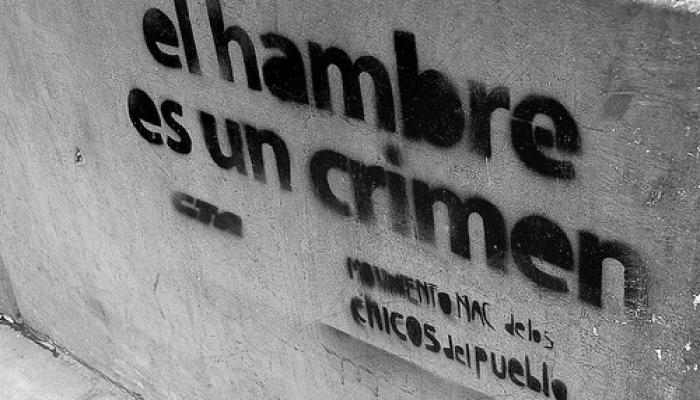Argentinian economist Raúl Benítez, head of the FAO, the Food and Agriculture Organization of the United Nations office for Latin America and the Caribbean, has gone on record saying that “although our South American continent has made great strides against hunger, it is still the most unequal region in the world.
Of the nearly 900 million hungry people on the planet, 50 million are in Latin America and in the Caribbean.” This, Benítez told the global news agency, the IPS, at the 38th FAO Conference in Rome last summer.
Benitez said that Hunger has even reared its head once again in countries like Argentina, whose population was amongst the best-fed in the world for much of the 20th century.
Silvia Ribeiro, Latin American director of the Action Group on Erosion, Technology and Concentration (ETC), referring to Argentina’s top export, said, “Today in Argentina there are children suffering from malnutrition caused, by all things, from the soy boom,”
“For more than 20 years, with the support of every administration, Argentina has pursued the massive expansion of soy cultivation, displacing cattle as well as crops. This has transformed the local diet,” said Ribeiro, whose action group monitors the impact of emerging technologies.
“Today,” Silvia Ribeiro has pointed out, “the poor in Argentina don’t drink cow’s milk but soy milk, and they don’t eat beef but soy substitutes, a monotonous diet resulting in malnutrition,”
“It’s as if the FAO only saw GDP, which does reflect greater agricultural production, but closes its eyes to the fact that this production is socially excluding and ecologically unsustainable, and only benefits big multinational corporations that produce for export,”
The FAO economist Benitez has admitted that “The Food and Agricultural Organization can only call attention to these phenomena and propose corrective measures; states are sovereign, and they may or may not adopt policies in line with our proposals.”
This Latin American economist pointed to the increasing use of genetically modified crops. “The most serious case is that of Mexican maize, because the government has approved experimental plots of transgenic maize seeds owned by companies like Monsanto and DuPont Pioneer.”
Recent research has found that transgenic maize causes cancer in rats.
Another study, for the European Food Safety Authority, discovered that most of the transgenic varieties approved for commercial use in the United States (54 out of 86) contain viralo genetic material that was not observed when they were approved, and may have harmful effects in plants, animals and people.
“At the FAO, we are aware that land grabbing and large agribusiness concerns can cause social exclusion and be environmentally unsustainable,” said Benítez. “Governments must weigh the short-term benefits against the long-term costs, which may be much higher, and make decisions accordingly.”
This brings us to The Bolivarian Alliance for the Peoples of Our America — ALBA, and PETROCARIBE, the regional oil company sponsored by Venezuela.--have self-imposed the goal of making the Caribbean and LA, an area free of hunger.
Both integrationist regional mechanisms have worked towards that goal since ALBA was created in 2004, and PETROCARIBE one year later, both on the initiative of the late Venezuelan President Hugo Chavez.
This ambitious decision was confirmed at the recent Summit of the Community of Latin American and Caribbean States, CELAC, held in Havana last January, and the member countries agreed to give it priority. Now, at a recent meeting in Caracas, the capital city of Venezuela, both integrationist mechanisms have agreed to foster the increase of the production of foodstuffs in each country to achieve self sufficiency.
PETROCARIBE is opening a sixty million dollar fund to finance activities aimed at the eradication of hunger and poverty over the next five years.
During Cuba`s chairmanship of ALBA, the FAO offered the member nations all needed technical cooperation and its expertise in the promotion of food security and agricultural and animal husbandry.
FAO is fully aware of the excellent job done by Cuba in those fields, turning it into one of the few countries in the area that has already achieved the first Millenium Development Goal—the eradication of hunger, and has converted its horrible pangs into a bad memory.


